Nicola Sturgeon: SNP backlash claims ludicrous
- Published
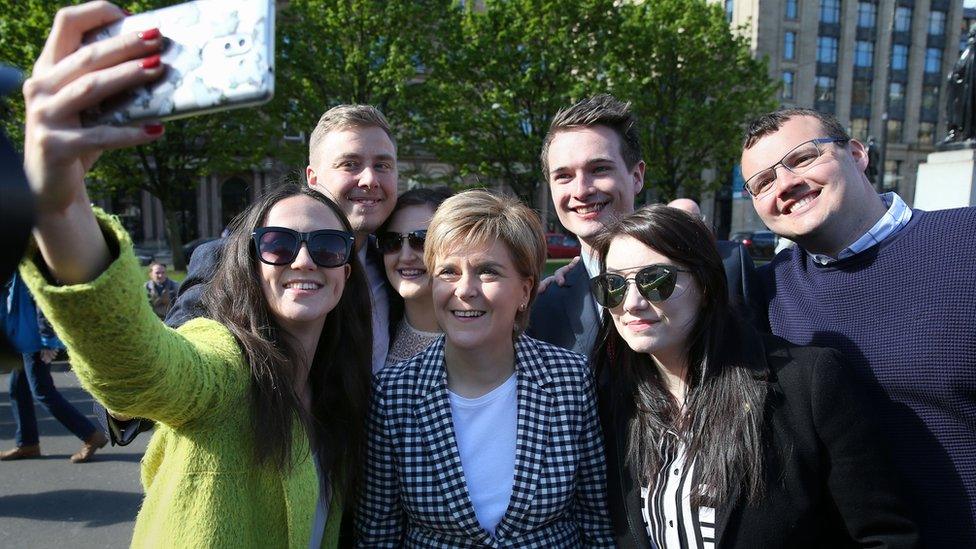
Ms Sturgeon joined the SNP's new council group in Glasgow
Nicola Sturgeon has dismissed as "ludicrous" claims of a backlash against the SNP over her plans for second independence referendum.
The SNP won most seats in the local elections but the Scottish Conservatives made significant gains.
Ruth Davidson said the results proved that her party was the only one which could challenge the Nationalists in the upcoming general election.
Labour and the Lib Dems said they would target seats in a bid to oust SNP MPs.
The first minister admitted the Conservatives in Scotland had "a good performance by their standards", with the party returning a record number of councillors north of the border.
But she insisted the SNP had "won this election comfortably" with her party ending up with "more votes, more seats, more councils where we are the largest party, not just compared to every other party but compared to five years ago".
Ms Sturgeon said: "Yes, the Tories made gains and had a good performance by their standards - but that support came from Labour not the SNP, so Labour and the Tories are fighting it out for second place while the SNP continues to be comfortably in first place."
She spoke out after Scottish Conservatives won a record 276 councillors north of the border - more than double the 115 they secured five years ago - with Tories now representing areas such as Paisley's Ferguslie Park - the most deprived part of Scotland - Shettleston and Ravenscraig..
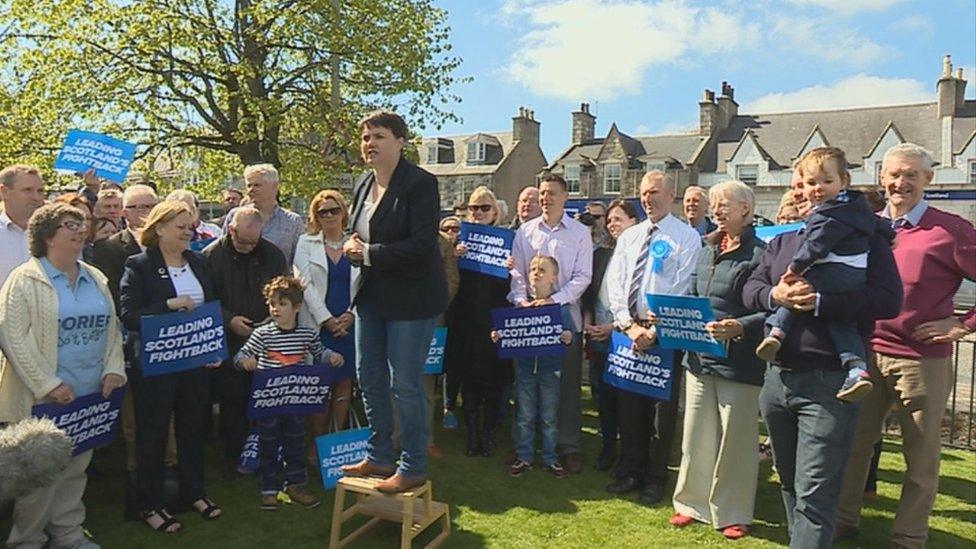
Ruth Davidson was out campaigning in Gordon
The SNP remains the largest party in local government with 431 councillors voted in.
But if voting patterns are similar at the general election on 8 June, a surge in Conservative support could see Ruth Davidson's party oust some SNP MPs from Westminster.
Meanwhile, Labour slumped to become the third largest party in Scotland's councils, and was kicked out of power in its Glasgow heartland for the first time in almost 40 years.
Ms Davidson said the results showed "only the Scottish Conservatives have the strength to fight back against the SNP".
She said: "We will speak up for the millions of Scots who have had enough of the uncertainty and division of the last few years.
"We will stand up for everyone who doesn't want a second referendum on independence."
'Over the moon'
Scottish Labour leader Kezia Dugdale, who has been campaigning in East Lothian, also said there had been a "clear backlash against the SNP's plans for a divisive second independence referendum".
However, Ms Sturgeon, who joined the SNP's new council group in Glasgow, said: "I've heard lots of ludicrous arguments in my time in politics but this takes the prize for the most ludicrous argument."
She insisted there was "not a shred of disappointment" that the SNP had failed to secure an overall majority in Glasgow City Council, where Labour had been in power since 1980.
Ms Sturgeon said: "I'm over the moon that we are the largest party in Glasgow and are about to form an administration in the city."
She added: "The term historic is often overused in politics but to see 40 years of Labour control in Glasgow brought to an end to be replaced by a new SNP city government probably makes that word 'historic' appropriate."
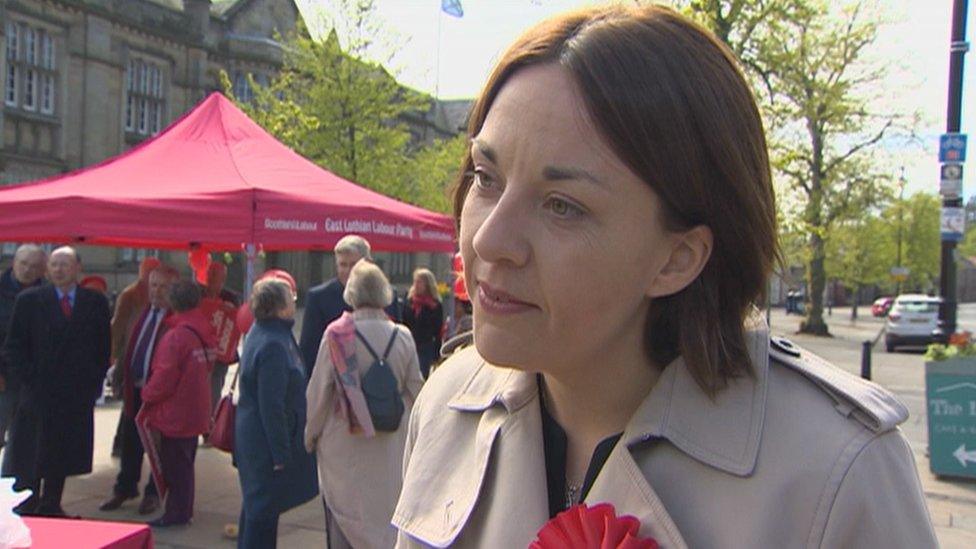
Kezia Dugdale said there had been a "clear backlash against the SNP's plans for a divisive second independence referendum"
Ms Davidson spent the day campaigning in Gordon, where Alex Salmond is the SNP's candidate - one of the Conservative's key targets of the general election campaign.
The Scottish Tory leader said: "This week's local government election has shown we are the only party in Scotland with the strength to fight back against the SNP - in every part of Scotland.
"We won the local government election in Gordon this week, beating the SNP into second place. It means that in this seat, as in many others, it is a two-horse race between us and the Nationalists.
"As is the case right across Scotland, the choice in Gordon is clear.
"It's between a Scottish National Party that will to take us back to more division and instability, and a Scottish Conservative party that will fight against another referendum so we can all move on together."
Scottish Labour deputy leader Alex Rowley meanwhile insisted his party was still a "major party" in local government, despite losing seats.
Mr Rowley stressed: "The SNP failed to win a single majority anywhere in Scotland, and the nature of the voting system means that cross-party deals may be agreed."
A meeting of the party's Scottish Executive Committee - which includes Ms Dugdale, Mr Rowley, trade unions and others - agreed Labour would not do any deals which would result in increased austerity for Scotland's poorest people.
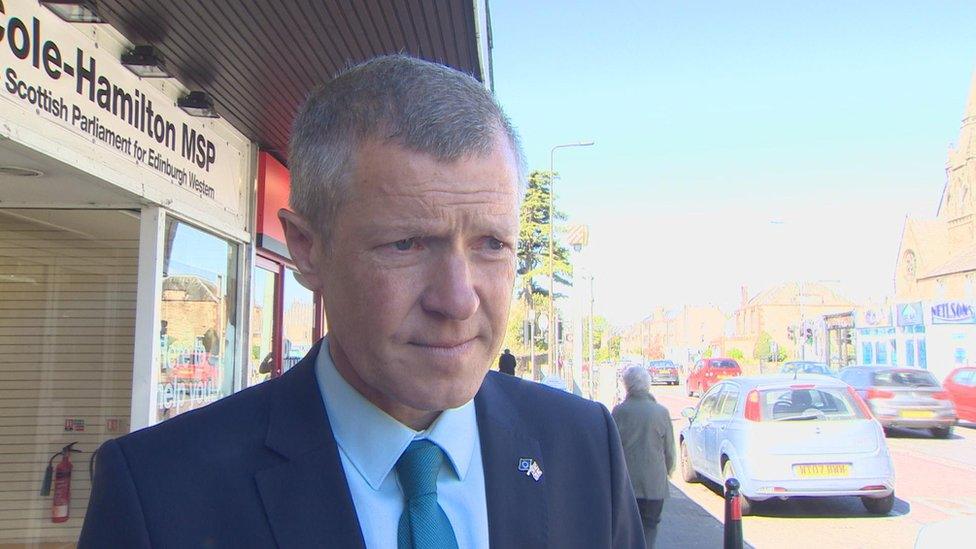
Willie Rennie was campaigning in Edinburgh
And James Kelly, the party's general election campaign manager in Scotland, insisted they were looking to win seats from the SNP on 8 June.
"In places such as Glasgow, North Lanarkshire, East Lothian, Inverclyde, Fife and elsewhere, the Tories are in a distant third place," he said.
"In a first-past-the-post general election, it's now abundantly clear it is only Labour that can defeat the SNP in these seats."
Lib Dem Willie Rennie, who was on the campaign trail in Edinburgh West, pointed out that their candidate in the nearby Almond ward got more than 6,000 votes on Thursday - more than any other candidate in Scotland since 1994.
"The results like this across Scotland are a real springboard to beat the SNP where we are challenging them on 8 June," he said.
"East Dunbartonshire, Argyll, Caithness and North East Fife were superb. We made gains in Gordon and Ross, Skye and Lochaber too.
"Our pro-UK, pro-Europe message with investment in education and mental health is strongest in the seats where we are challenging the SNP at Westminster."
- Published6 May 2017
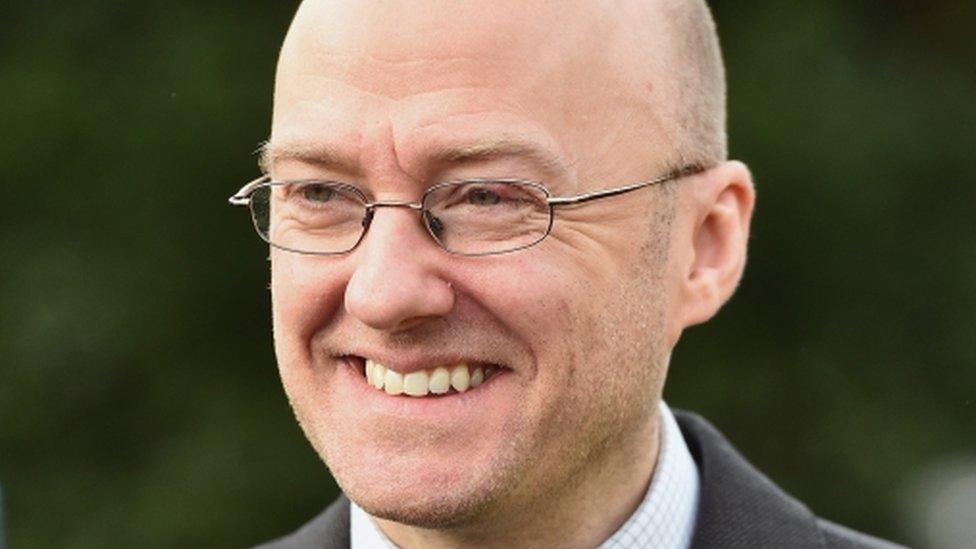
- Published5 May 2017